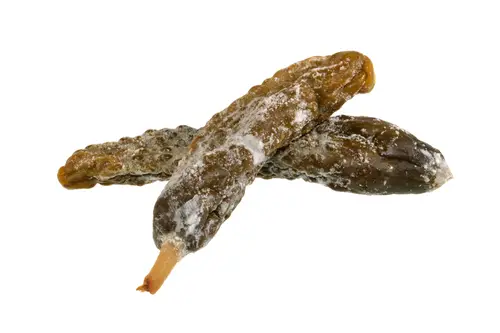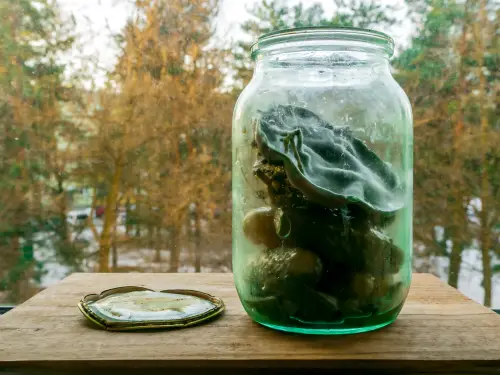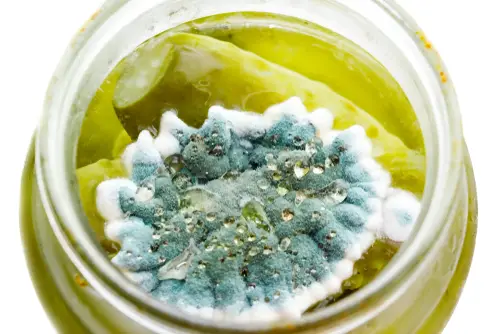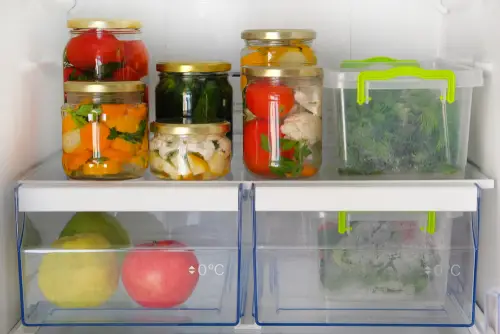Pickles are an all-time favorite snack in most American homes. Whether served as part of a burger or salad or on their own, you can never go wrong with these tangy bites.
When it comes to the storage of pickles, however, many people do not know whether or not to refrigerate them. So, should you refrigerate pickles? It all depends on the type and state of the pickles.
Generally, canned and sealed pickles do not require refrigeration as long as you keep them in a cool and dry place, preferably at room temperature. Once opened, refrigeration can help keep pickled foods longer.
What is a Pickle?

Before getting lost in the vast world of pickles, let’s first find out what pickles are.
In the US, pickles originally refer to whole or sliced cucumbers stored in a solution of brine, vinegar, and spices (optional) for preservation purposes.
In the rest of the world, however, and according to Merriam-Webster’s dictionary, pickles can be any piece of fruit or vegetable stored in the same process as mentioned above.
Examples of other pickled foods include berries, cabbage, cauliflower, onions, and even boiled eggs.
It is important to note that ‘pickles’ refer to cucumbers stored in brine, while ‘pickled food’ can be any other type of food.
Do Pickles Go Bad?
Like any other food, pickles do go bad, especially with poor handling during processing and storage. They simply have a longer shelf-life compared to non-pickled foods.
With proper handling, pickles can last for over two years without expiry. Some pickles even last beyond their marked best-before dates, especially commercial pickles.
How Long Can Pickles Stay Out of the Fridge?

A can or jar of unopened pickles can have an indefinite shelf life outside the refrigerator. The average shelf life of a sealed jar or can of pickles outside the fridge is 2 years.
Pickles stored in larger containers, such as barrels, in basements away from direct sunlight and warmth can keep much longer.
On the other hand, an opened jar of pickles can stay for up to a year outside the fridge without spoiling, as long as the pickles stay well covered by the brine and vinegar solution.
Should You Refrigerate Pickles?
People came up with the pickling process to preserve food way before refrigerators were invented. With this in mind, one can argue that refrigerating pickles is possible but unnecessary.
Unopened pickle jars may not require refrigeration, especially if you have cool and dry areas to store the containers.
Refrigeration can, however, come in handy where you have already opened jars of pickles. Low refrigeration temperatures discourage the growth and survival of contaminant bacteria, thus keeping the pickles fresher for longer.
When Should You Refrigerate Pickles?
You should refrigerate pickles in four instances, especially:
- When you buy your pickles from a refrigerated section of the grocery store.
- After opening but not finishing a jar or can of pickles.
- When you made the pickles at home but are not too sure of the process.
- When you do not have a cool storage area in your house.
How Long Do Refrigerated Pickles Last?
Refrigeration only prolongs the preservation process of pickles. Therefore, an unopened jar of pickles can last indefinitely, while an opened jar of pickles can keep for up to 2 years.
Are Refrigerated Pickles Safe to Eat?
Refrigerating pickles does not tamper with pickles, especially if you handle the jars and pickles with proper sanitation. Whether homemade or store-bought, refrigerated pickles remain safe to eat unless they show signs of expiry.
Can You Freeze Pickles?
The short answer is yes, you can freeze pickles. You should, however, note that freezing pickles tampers with their texture, making them mushy and sometimes tasteless once unfrozen. The loss of flavor happens because of the crystallization and expansion of water molecules during the freezing process.
Frozen pickles are best eaten within six months. It would be best if you also ate all the pickles once thawed because refreezing pickles greatly destroys their quality.
How To Tell if Pickles Have Gone Bad

Although we have seen pickling as indeed an efficient way of food preservation, pickles can and do go bad. No food is immortal, after all, right? Here are four signs to look out for, which will let you know when to toss that jar of pickles.
1. Fizzing or Foaming Brine
The brine and vinegar solution has a high amount of acidity, which plays a role in preserving the pickles’ freshness and flavor.
The solution, when good, stays still and motionless for the most part since oxygen is absent in the pickle jars.
When the brine starts to fizz or foam, you should take this as a sign of irregular and unwanted reactions in the pickle containers and thus get rid of them.
2. Discolored Brine

Good and healthy pickle brine is mostly clear and colorless. Its clear nature allows you to keep an eye on the pickles during storage.
If you notice any discoloration on the brine, take it as a sign of possible pickle spoilage. Brine discoloration can be anything from cloudiness to brown, yellow, or green coloring.
Read Also: How Long Does Leftover Chili Last in the Fridge? (With Storage Tips)
3. Moldy Pickles
Mold grows and thrives in dark and poorly aerated areas such as under beds and behind wallpapers. Mold also grows on food that contains yeast or has undergone fermentation but without proper handling.
If you notice any dark moss-like spotting or growth in the stored pickles, you should get rid of it.
Do not eat any of the pickles in a jar with a moldy pickle, even if they do not have mold as well. You may end up suffering from food poisoning.

4. Foul Smell
The most obvious sign of expired or spoiled pickles is a bad smell from the pickle jar. A good container of pickles should not have any other smell apart from that of vinegar and the spices used, if any.
Otherwise, if you open a jar of pickles and are met with a strong, pungent smell, make sure to discard said jar immediately, even if it does not have any other of the signs mentioned above.

